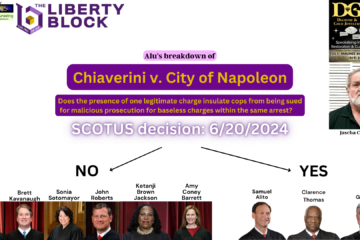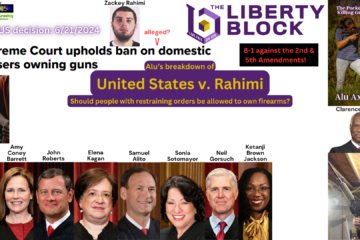By D. S. Dexter Tarbox, Jr. for The Liberty Block
As I sit here at the keyboard, I find myself hoping-against-hope that in New Hampshire, the union, and—indeed—the world, there are flavors of libertarianism that reject the one which I contested last week in my debate on legalized suicide at the SHELL.
I will admit that there were moments in the debate where I was left unusually flummoxed, but the normal awkwardness that I would feel in such circumstances was mitigated by the troublesome quality of those points which raised my bafflement. Even days later, my mind remains engaged with the question: can they really believe that all morality is so self-determined, that no universal principles exist beyond pursuing one’s own interest?
The libertarian argument advanced by the resolution’s proponent contended that most individuals should be legally allowed to commit suicide with whatever willing assistance was available. I counter-argued along two lines (moral and practical), and although the latter concern does remain largely unaddressed, my exclusive interest in writing this piece is the former.
Where active questions of life or death are concerned, the rhetorical positions are rather binary. One either asserts that it is appropriate to curtail the animate humanity of another person under certain circumstances, or else that is inappropriate under the same. Nearly all non-pacifists would agree that using fatal aggression to defend one’s person is an acceptable effort against a reasonable threat, while the same might not be said of a minor offense, wherein the threat failed to rise to the deadly level. For instance, one should not defensively kill a libeler or a cheat.
But what are we to do when the prevailing morality bears no regard for the intrinsic value of human life? If the mortal fate of a living person depends upon the standard of an arbitrary or flexible ethos, how can we rest easy that any society will continue the prevention of—for example—even such grievous crimes as murder? If the final question of morality depends only upon each person doing whatever he wishes, according to what set of rules will we justly decide any controversy? One can’t immediately tell by what code a stranger he encounters on the street lives (and therefore the ethical boundaries to which he conforms his behavior), as these invisible lines are personal, fundamentally arbitrary, and ultimately movable. However, one needs to know nothing about him to appreciate the clear line that exists as concerns the value of his life –– unlike others, this line is universal and cannot be crossed.
Expecting that a common language of goodness existed across most thinking populations, I was amazed to find my argument expounding the universal intrinsic value of human life met rather bluntly with a direct rebuttal. Not only was I told that libertarians put no stock in the notion of life’s inherent value, but that the only appreciable gauge for virtue was indeed the mere propinquity of unrestrained freedom. The primal importance of human life was not here at stake, but only the question of total individual liberty: so long as an action was justified by pursuit of this “liberty,” the supreme moral rectitude of that act was supposedly manifest.
One can quibble with my application of the term “liberty” as opposed to “autonomy,” or “self interest” as against “self ownership,” but these matters are largely semantic and only serve to obscure the essential issue.
Traditional suicide, assisted suicide, and even involuntary euthanasia — under the argument I confronted in the debate, none of these are questions of life at all, but the casual exercise of that same blanket commitment to unmitigated freedom of behavior.
I have often joked that many New Hampshire Republicans are actually closet libertarians; but I find even my own libertarian leanings devastatingly challenged by this worldview. While I share an enthusiasm to maximize the people’s freedom from government, such a world would indeed be a terrifying place to live if its only moral conceit was self-interest. Under this philosophy, how does the desired libertarian state not cease to be a utopia, but instead a brutal reversion to the state of nature? To expect that any good might prevail in such a society would be to embrace the likes of Rousseau — a proposition more readily taken-up by undergraduates and authoritarian leftists than by lovers of liberty.
Without any belief in extrinsic morality, no society can exist.
The question of legal suicide—with all its many practical counterarguments put aside—illuminates the deeper and more dangerous matter which the debate conceals. The radically solipsistic belief that the water’s edge of morality is one’s own desire presents a bleak future for the world; and therefore, the salutary libertarian conceptions of good government must be balanced with an acceptance of that moral code which is both manifest and universal. Absent this vital reverence for life, I suspect that the entire movement may dissolve into ultimate obscurity.
The opinions expressed by this author do not necessarily reflect the opinions of The Liberty Block or any of its members.



8 Comments
Deanne · March 22, 2022 at 11:48 am
I just watched the first half of the debate. Unfortunately, due to Mr. Pratt’s use of obscenity, I was compelled to skip the rest of his talking. I refuse to listen to people who can not speak respectably and who hurl insulting language at me. His level of decency is not equal to his purported level of education. I thought I might try to skip along to hear the rest of what Dexter had to say, avoiding potential verbal bombs by Mr. Pratt, but decided it would be very chopped up so I didn’t try. My policy is to immediately turn off videos/audios or stop reading when people can’t be polite and treat listeners/readers with common respect and decency and use such foul language. I feel badly to have to miss the second half, but I don’t intentionally put garbage in my mind and heart, and expected a higher standard in a public debate.
Despite not listening to anything else Mr. Pratt said, I got the gist of the argument and one of the first things that comes to mind is something that Mr. Pratt did not address (at least until his verbal insult), which is that his “right to be killed” inherently involves another person being involved who would have the “right to kill.” In this way, I think he is correct that he is selfish. For him to die as he wishes, someone else is required to assist in his murder.
I do not understand how a person could live with their conscience by earning money through helping end people’s lives. How could a doctor, who presumably took an oath to “do no harm,” be involved in the ultimate harm of taking people’s lives?
A person can take their own life if they really want to, as sad as that may be, but to involve someone else is to make that other person a murderer. If murder is okay under certain circumstances, where will the line be drawn? If a person is determined to be mentally incompetent (according to a government that approves of what Mr. Pratt proposes) who could be designated to make the decision to end their life? (Answer: that same government)
Mr. Pratt’s position would open the door for a new definition of murder. It shows a disregard for life. The right to life is in the Declaration of Independence, but they didn’t mention a right to have someone kill you.
I lost my mom 7 years and 4 months ago. I was devastated and lived in a blur for about 5 years and still live under a dark shadow. I can’t imagine how difficult it would be if her life had been intentionally shortened. I did everything I could to help her recover, researching options and whatever I could do. I don’t know how I could live with myself if I had to look back on that and remember I had given up on her, or worse, if I had participated in, or acquiesced about, ending her life. One thing that was said to us a few months before was “Where there is life, there is hope.”
A man I know of was on hospice. His family got something for him they thought would relieve his pain during his last days on earth. Well, it did more than that, and he recovered. What they got for him was cannabis.
Thank you, Dexter. Where there is life, there is hope. Accelerating or causing death does not honor life. You are right.
The Liberty Block · March 22, 2022 at 1:20 pm
Thank you very much for the thoughtful and sincere comment!!!
D. Dexter Tarbox · March 22, 2022 at 10:12 pm
Deanne –– thank you for the level of thought which you’ve so clearly committed to this issue. You have indeed identified aright those questions on which the debate rests.
Language aside, I’ll tell you that Mr. Pratt has always been a true gentleman in his personal interactions with me; and so I hope that you will not be too negatively impacted by the objective wrongness of his incorrect position on legal suicide.
Your mother’s story precisely underlines the question which any reasonable person must confront: how can we ever morally justify the artificial shortening of an otherwise innocent human life? The existence of life is indeed synonymous with limitless hope, and not to be casually destroyed.
Thank you for both vocally advocating in favor life, and for your personal courage in expressing such a position.
–DST.II
Nathaniel · March 22, 2022 at 11:55 am
There is a set of principles that are built into this universe that we can look to that are objective and moral. These principles come from Natural Law. Some people refer to it as consequentialism, or even karmic law.
The question of legal suicide is an easy one once you take first principles into account. The new question is, does the person who wants to commit suicide own their body? If one is being honest with themselves, then the answer is yes, and thus the person has the right to commit suicide.
Any so called Anarchist that doesn’t understand that there are rules that need to be followed aka Natural Law based upon objective morality understands nothing about freedom at all and can never create a society based in freedom and are therefore not true anarchists.
Anarchy means without rulers, therefore no masters, no slaves. It does not mean without rules. This world is so messed up that even freedom-loving people don’t seem to understand this.
The Liberty Block · March 22, 2022 at 1:20 pm
Excellent points about the technical definition of anarchism, Nathaniel!!
D. Dexter Tarbox · March 22, 2022 at 11:09 pm
So do you endorse both the ideas of Natural Law and social anarchy at once? If that’s the case, how do you so clearly determine that innate morality permits of suicide? Indeed, how do you ever propose to respect any Natural Law in an anarchistic society?
Nathaniel · March 23, 2022 at 2:16 pm
All rights are property rights. The right to life is our most valuable right because without it we have no rights due to being dead. Because the person owns their body, they have the right to end their own if they so choose to.
All wrong doings can be summed up with the phrase don’t steal.
Murder is the taking of life that is not yours to take.
Rape is stealing the choice from another to choose who they sexually associate with.
Theft is the stealing of another’s property that is not rightfully yours.
Trespass is the theft of one’s right to feel secure in their dwelling place or other property they own.
Deception is the stealing on one’s right to make informed decisions.
There are other forms of transgression but, I think you get the idea. Now there is another way to look at this and that is to get consent.
I cannot steal from someone if I have consent, it is either a gift or you borrowing it at this point.
I cannot rape someone if I have consent
I cannot trespass on their property if I have permission to be there
If I am being fully honest with someone, then we can come to a consensual relationship
If I have permission to and have consented to help someone else end their own life and both parties agree to it, then there is nothing morally wrong with doing so. Everyone involved has agreed to do it. This is not in any way, shape, or form the same thing as murder.
If a doctor doesn’t want to partake in assisted suicide, then the doctor has the right to refuse (I am not speaking of man’s law here aka statutory law). Compelling someone else who wants nothing to do with such things is also morally wrong.
Deanne · April 1, 2022 at 2:49 am
I just received the following link in an e-mail and thought of this post. I watched the video about Jesse Ramirez and read some about a law which, if passed, could obligate doctors to participate in physician-assisted suicide despite their beliefs to the contrary. Of course, those who truly disagree with it would not do it, but that would mean they would be breaking the law if they refused and they could be dragged into court and face penalties for living by their consciences.
Anyone interested in this issue, or wondering what the repercussions of such laws would be, should check out this link: https://adflegal.org/blog/what-physician-assisted-suicide-and-why-should-you-care-about-it?sourcecode=10021896_r800&utm_source=pardot&utm_medium=email&utm_campaign=case_watch
Comments are closed.